McGlothlen Last Name Origin
Charles McGlothlen (1780-1850) is the first known ancestor who used the McGlothlen surname. He was born in Virginia in 1780, and also lived in Indiana, Missouri and Iowa before his death in 1850. Two of his sons, John Davis McGlothlen (1810-1878) and Thomas Davis McGlothlen (1816-1905), settled in Iowa in the 1840s.
McGlothlen is an alternate spelling to the more common surname McLaughlin. The ancestors of Charles McGlothlen emmigrated from either Scotland or Ulster/Northern Ireland in the 1700s.
Name Etymology
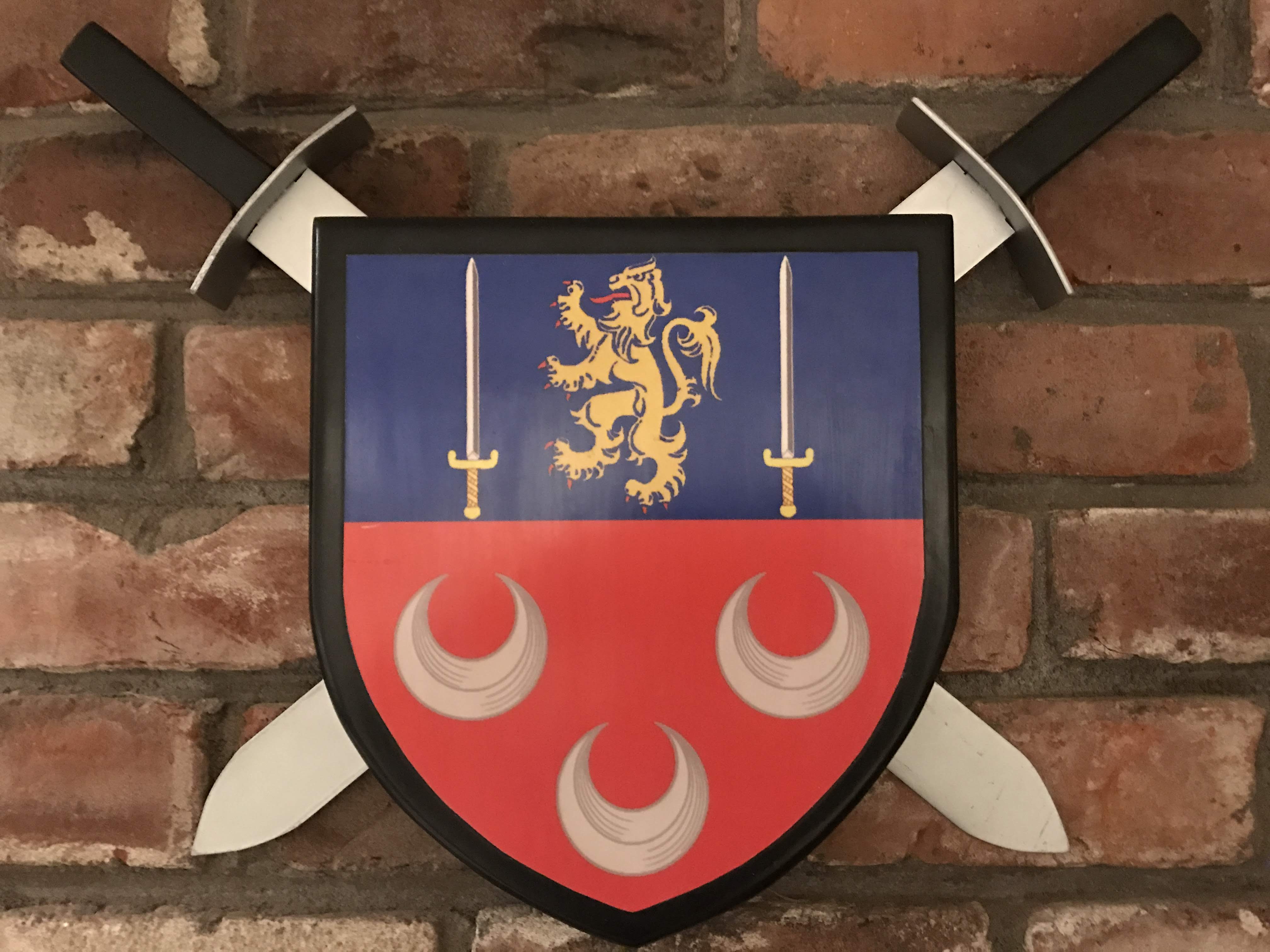
The name McGlothlen likely originates from MacLaughlin, and MacLochlann before that. Laughlin is a Scottish first name, and putting the Mac in front of it means clan or son of Laughlin. Laughlin is derived from Lochlann or "Loch Land" which means somebody from Loch Land which can also mean Scandanavian invader. "Mc" is an anglicised version of "Mac" which likely was used in Northern Ireland/Ulster. Many modern Irish surnames reflect this, with McLoughlin (Mac Lochlainn) and McIvor (Mac Iomhair), for instance, deriving from a combination of the Gaelic patronymic with a Norse personal name.
The surname Mac/Nic Lochlainn originated in Ulster. Lochlann was originally a name for Scandinavia, especially Norway, so called after the fjords - Lochlainn, the adjectival form, literally means "lake-ish" or "full of lakes," a "land of lakes," etc. The Annals of Ulster refer to the Vikings as Lochlannach meaning "of Lochlann." [1] Lochlan(n)/Lochlain(n) is still used as a man's personal name in Ireland and Scotland, though not commonly. English forms of the surname Mac/Nic Lochlainn are concentrated in western Ulster, on both sides of the international boundary. But the family are found throughout Ulster, and spread eastward during the Middle Ages, across the North Channel into Scotland where they became the Clan MacLachlan. Spellings of the name peculiar to Scotland include McLachlan, McLachlin, and McLauchlan. The Mac/Nic Lochlainn and their Scottish cousins are descendants of the Northern Uí Néill.
Clan MacLachlan
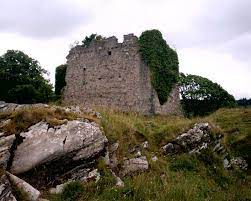
Clan MacLachlan is one of the oldest Scottish Highland clans. There are numerous spellings used by people around the world who originate from the clan, including Maclachlan and MacLaughlin. If your name is Claflin, Ewan, Ewing, Gilchrist, Lachlan or MacEwan you are also part of the clan. The clan is descended from Lachlan Mor (‘Great Lachlan’) a powerful chieftain who lived on the shores of Loch Fyne in the 13th century. Lachlan Mor is said to be descended from Anrothan O’Neill an Irish prince who left Ireland in the 11th century. A further line of descent is claimed from Anrothan O’Neill to the High King of Ireland, Niall Noigiallach, who ruled in the 4th to 5th century.
The first documentary evidence of the clan's ownership of the land known as Strathlachlan on the east of Loch Fyne was in 1292, when Gilleskel Maclachlan received a charter from John, King of Scots.
Old Castle Lachlan’s existence was first acknowledged in a document dated 1314. In 1680 the Maclachlan lands were made a barony by Charles II of England. To this day the chief of the clan is styled as Baron of Strathlachlan.
Charles McGlothlen (1780-1850)
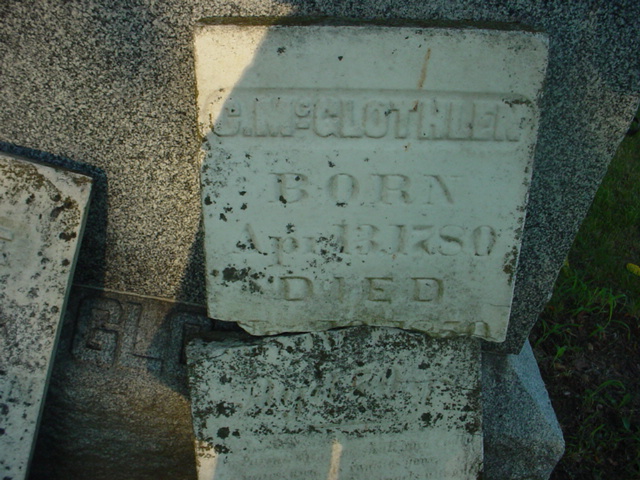
According to http://k-f-g-online.info/Directories/DonMcGlothlen/:
The originator of the spelling of the surname "McGlothlen" is believed to be Charles McGlothlen. Charles McGlothlen was born 1780 in Greenbrier Co, VA, and died 1850 in Wapello Co, IA. Charles' parents were illiterate, as was his one known brother, John, b. 1794 in TN. The parents' recorded data show spellings of McGlothlin and McLaughlin and Charles' brother John's data shows primarily McGlothlin, which spelling has been adopted by his descendants to the present day.
Spouses:
- Jane Davis
Children:
- Rebecca McGlothlen Cain (1806 - 1870)
- John Davis McGlothlen (1810 - 1878)
- George Harlan McGlothlen (1812 - 1895)
- Thomas Davis McGlothlen (1816 - 1905)
- Sarah M. McGlothen Mendenhall (1822 - 1846)
- Eleanor Jane McGlothlen Newhouse (1828 - 1904)
Wapello County, Iowa
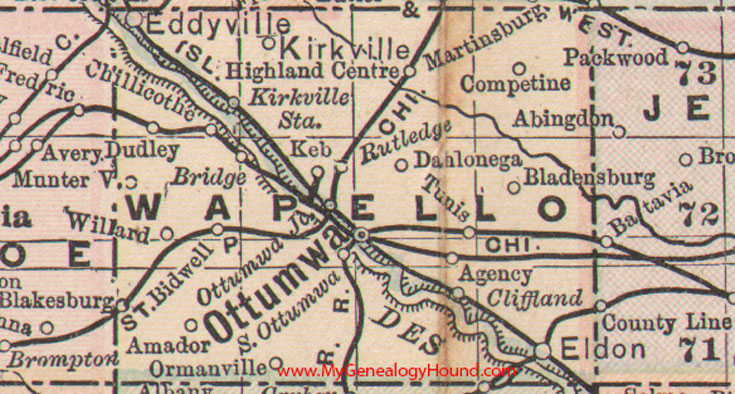
John Davis McGlothlen and his brother Thomas Davis McGlothlen, both came to Wapello County Iowa from Indiana when land sales first opened up in the mid 1840s. Before that in 1819, the family removed from Indiana to Missouri, where they remained for two years, and then moved back into Indiana, and lived there twenty-seven years. Thomas and John came to Wapello County, Iowa in the spring of 1845, and purchased 120 acres of unimproved land. A pioneer cemetery called the McGlothlen Cemetery containing many of the family members can be found near Wappelo, IA.
Thomas Davis McGlothlen (1816-1905)
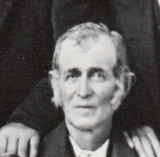
According to The Iowa Legislature:
Thomas Davis McGlothlen Born in Wayne County, Ind., December 10, 1816. He is the son of Charles and Jane (Davis) McGlothlen, and was reared upon the farm of his parents. Thomas came to Wapello County in the spring of 1845, and purchased 120 acres of unimproved land. The marriage of Thomas D. McGlothlen and Miss Sarah Meek, of Kentucky, was celebrated in Fountain County, Ind., in 1836, when our subject was twenty years of age. Since coming to this vicinity Mr. McGlothlen has been actively interested in public matters, and his talents have received due recognition. In the fall of 1862, after occupying other prominent positions among the councils of his townsmen, he was elected to the Iowa Legislature, in which he served acceptably for two years. He has been a member of the Board of Supervisors, and the incumbent of other minor offices. In addition to the ordinary pursuits of agriculture, Mr. McGlothlen has given much attention to the breeding of fine stock. Mr. G. and his wife are members in good standing of the Christian Church.
Spouses:
- Sara McGlothlen
- Martha McGlothlen
Children:
- John W. McGlothlen (____ - 1878)
- Rebecca Jane McGlothlen Reveal (1837 - 1917)
- Mary Isabelle McGlothlen Bell (1840 - 1889)
- Jacob Lilburn McGlothlen (1845 - 1925)
- Milly Eleanor McGlothlen Harris (1847 - 1931)
- Thomas Benton McGlothlen (1852 - 1918)
- Andrew Jackson McGlothlen (1856 - 1901)
- George Marion McGlothlen (1858 - 1931)
- Adolphus D McGlothlen (1864 - 1937)
John Davis McGlothlen (1810-1878)
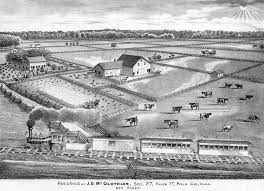
According to www.findagrave.com:
John D. McGlothlen informs us that when he arrived, with his family, at their new home in Allen township, which occurred in June, 1846, he accepted the hospitality of James Davis, an old bachelor, who tendered his cabin to the new-comers until such time as they could erect one for themselves. Here, in their new home, the ague made an invasion; and Mr. McGlothlen, his wife, and children, became victims of this annoying disease. October 2d, 1846 , they got possession of the cabin on their own farm. The structure they inhabited had but one room in it; and the puncheons used for flooring purposes were so scanty that they covered by half the earth on the inside from view. There was neither door nor window; but as a substitute for these, the opening which had been made for a fire-place, was employed for this purpose. In time, however, as the fire-place and chimney were in process of construction, it became difficult to establish communication with the outside world through such a peculiar orifice. In the midst of sickness and discouragements, the necessary improvements were made to the building before the advent of very cold weather. The nearest grist mill, at the time, was Duncan's, near Oskaloosa; and during the fall of 1846, Mr. McGlothlen took his team of four horses, and large covered wagon – the same which had brought himself and family from Indiana – and proceeded to the mill, taking with him a number of grists for waiting families in the neighborhood. Arriving at the mill, he found it so crowded with anxious customers, that he deemed it advisable to go farther. At Farmington, he found the situation the same; and success did not crown his efforts until he reached Bonaparte, on the lower Des Moines river. On the homeward route, bad weather set in, and teaming became heavy and laborious. It took him just twenty-one days to make the round trip.
Spouses:- Sophia F Adamson McGlothlen (1835 - 1864)
- Charity M Beck McGlothlen (1813 - 1860)
- Mary Elizabeth Bender McGlothlen (1847 - 1919)
- Martha Jane McGlothlen Chiles (1831 - 1867)
- Louisa M McGlothlen Hurd (1836 - 1860)
- James F McGlothlen (1838 - 1872)
- Jackson Davis McGlothlen (1842 - 1877)
- Mary E McGlothlen (1848 - 1865)
- William Thomas McGlothlen (1853 - 1914)
- Minerva A McGlothlen (1861 - 1863)
- John M McGlothlen (1863 - 1863)
- Emma McGlothlen Hull (1867 - 1958)
- Levi McGlothlen (1871 - 1958)
- Stella McGlothlen Webster (1877 - 1969)
Contact
